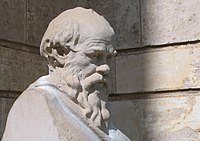
Back استجواب سقراطي Arabic Mäeutik German Cuestionamiento socrático Spanish موضوعات سقراطی Persian Pertanyaan Sokratik ID Сократтық сауал қою Kazakh Сократ лавлах Mongolian سقراطي پوښتنې Pashto/Pushto Questionamento socrático Portuguese คำถามแบบโสกราตีส Thai
| Part of a series on |
| Socrates |
|---|
 |
| Eponymous concepts |
| Pupils |
| Related topics |
|
|
Socratic questioning (or Socratic maieutics)[1] is an educational method named after Socrates that focuses on discovering answers by asking questions of students. According to Plato, Socrates believed that "the disciplined practice of thoughtful questioning enables the scholar/student to examine ideas and be able to determine the validity of those ideas".[2] Plato explains how, in this method of teaching, the teacher assumes an ignorant mindset in order to compel the student to assume the highest level of knowledge.[2] Thus, a student is expected to develop the ability to acknowledge contradictions, recreate inaccurate or unfinished ideas, and critically determine necessary thought.
Socratic questioning is a form of disciplined questioning that can be used to pursue thought in many directions and for many purposes, including: to explore complex ideas, to get to the truth of things, to open up issues and problems, to uncover assumptions, to analyze concepts, to distinguish what we know from what we do not know, to follow out logical consequences of thought or to control discussions. Socratic questioning is based on the foundation that thinking has structured logic, and allows underlying thoughts to be questioned.[3] The key to distinguishing Socratic questioning from questioning per se is that the former is systematic, disciplined, deep and usually focuses on fundamental concepts, principles, theories, issues or problems.
- ^ Jacques Brunschwig, Geoffrey Ernest Richard Lloyd (eds), A Guide to Greek Thought: Major Figures and Trends, Harvard University Press, 2003, p. 233.
- ^ a b "What is Socratic Questioning". Starting Point - Teaching Entry Level Geoscience. Carleton College. Retrieved March 31, 2018.
- ^ Paul, Richard; Binker, A.J. (1990). Critical Thinking: What Every Person Needs To Survive in a Rapidly Changing World. Foundation for Critical Thinking. p. 360. ISBN 0-944583-08-3.